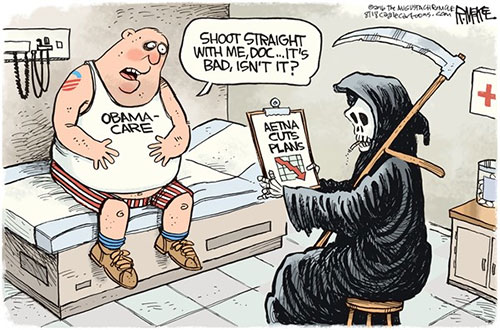
Obamacare, Not Drug Prices, to Blame for Record High CostsBy PHIL KERPEN Seoptember 22, 2016
Looking to dodge political blame for Obamacare's spectacular failure and steeply higher health care costs, Democrats and their insurance industry allies have settled on a poll-tested strategy of pretending prescription drugs are the principal driver of higher costs ---- despite the fact that data proves such claims completely false. The latest Altarum Institute report shows that prescription drug spending is just 10 percent of total health spending, versus 32 percent for hospital and 20 percent for physicians and clinics. And the smaller piece of the pie is also growing more slowly ---- just 3.9 percent for drugs versus 4.6 percent for hospitals and 5.2 percent for physicians over the last year.
Obamacare Death Spiral
The biggest driver of increased costs are health insurance premiums, which 26 percent of those surveyed say are their number one health care cost concern. This is in comparison to 19 percent for hospital or emergency room visits, 17 percent for the care of a sick or aging loved one, and 16 percent for doctor bills. Just 11 percent said drug costs, the lowest of any health care component. The Democratic political talking points were a little bit more connected to reality two years ago, when drug spending rose by 12.4 percent. But that jump also corresponded to an environment in which more medicines were placed in development than at any time in our history, and many new, innovative drugs arrived on the market.This includes a milestone, and yes, expensive, new drug that cured patients suffering from Hepatitis C.This breakthrough was quickly followed by similar drugs from other research companies that achieved the same miraculous results and lowered the costs of these treatments. As Bill Gates, the world's most prodigious philanthropist, recently explained: "I think the current system is better than most other systems one can imagine. I mean curing hepatitis C. This is a phenomenal thing and now you have multiple drug companies competing in terms of the quality and the price of that offering." Contrast that with what we have witnessed from health insurers of late: higher premiums, skyrocketing co-pays and deductibles, and less and less access to needed treatments.And make no mistake, with the pending insurance premium increases anticipated in 2017 families will face even more costly challenges.As a result, proponents of Obamacare are already falling back on their old tactics of promising to solve problems through arbitrary price controls and more government regulation over prescription drugs. Doing so would have the opposite effect on drug costs and continue to give insurers a pass. "The drug companies are turning out miracles and we need their R&D budgets to stay strong. They need to see that opportunity," Gates correctly observed. "For things like Alzheimer's, they can reduce medical costs so dramatically and improve the human condition, and the pharmaceutical companies have been great partners of our foundation. When we need help in doing science they are unique in what they can do." The total cost and time of bringing a single new drug to market is now $2.6 billion, per the Tufts Center for the Study of Drug Development, and averages 10 years of development. Capital markets are intensely competitive, and the prospects of large returns on truly significant breakthroughs are necessary to drive investment, cure diseases and allow people to live longer, healthier, happier lives. So let's keep the focus for fixing the problem of skyrocketing costs where it belongs ---- on Obamacare ---- and not allow its supporters to use their own law's failures as a pretext for even more government regulations that could stall the search for new cures.
©2016 Phil Kerpen. This column has been edited by the author. Representations of fact and opinions are solely those of the author.
Representations of fact and opinions in comments posted are solely those of the individual posters and do not represent the opinions of Sitnews.
E-mail your news & photos to editor@sitnews.us Publish A Letter
|
||
